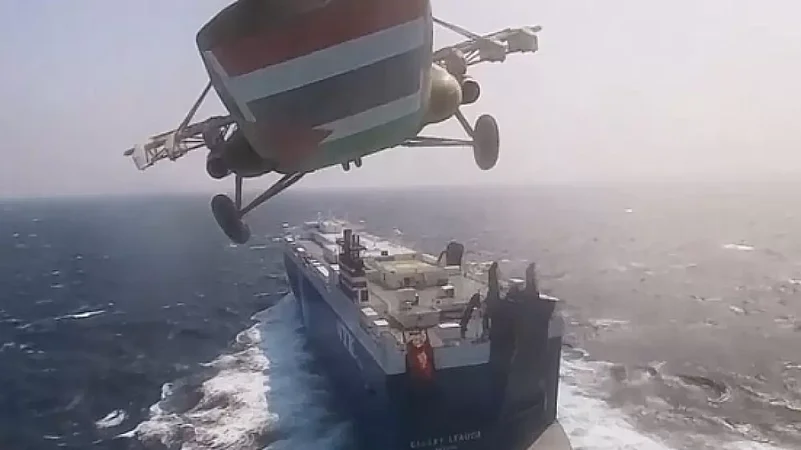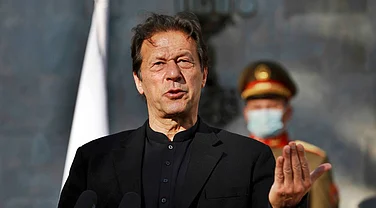The Red Sea has become a focal point of international attention as Yemen's Iran-backed Houthi rebels escalate their assaults on ships, prompting major shipping companies and oil giant BP to suspend trade through this vital waterway.
The attacks were intensified during the Israel-Hamas conflict and have not only impacted global trade but also triggered a coordinated response from the U.S. and its allies.
As maritime safety concerns rise, global leaders engage in discussions, and a new international mission is launched to counter the persistent threat in the Red Sea.
Global trade disrupted as shipping giants and BP halt Red Sea transits
The Red Sea faces disruption in global trade as Yemen's Iran-backed Houthi rebels intensify assaults on ships during the Israel-Hamas conflict.
Major shipping companies, alarmed by the escalating attacks, have suspended trade through the vital waterway. BP, a prominent oil and gas corporation, has also taken precautionary measures, announcing a temporary pause on all transits through the Red Sea, including shipments of oil and liquid natural gas. The decision prioritizes the safety of crew members and is under ongoing review.
According to BP, "We have decided to temporarily pause all transits through the Red Sea. This is a precautionary pause, and we continue to monitor the situation closely."
PM Modi and Netanyahu discuss maritime safety
Indian Prime Minister Narendra Modi and Israeli Prime Minister Benjamin Netanyahu engaged in discussions concerning the safety of maritime traffic on Tuesday.
Expressing his concerns, Modi highlighted India's consistent stand in favor of the "early restoration of peace & stability in the region with continued humanitarian assistance for the affected." The Israeli readout emphasized the leaders' shared concerns about the safety of maritime traffic.
Netanyahu briefed Modi on recent developments in the Israel-Hamas conflict, with both leaders underscoring the importance of securing freedom of navigation in the Bab-el-Mandeb.
According to the Israeli release, "Indian Prime Minister Modi noted the importance of securing freedom of navigation in the Bab-el-Mandeb, which is threatened by the aggression of the Houthis, instigated by Iran, and the global interest in preventing attacks on the global economy and trade, as well as the Indian and Israeli economies."
US announces international mission to counter Red Sea attacks
The United States, along with several nations, has announced the formation of a new force to protect ships facing attacks, primarily from Houthi-controlled areas of Yemen.
Defense Secretary Lloyd Austin revealed the seriousness of the attacks, leading to multiple shipping companies holding vessels in place.
The mission will be coordinated by Combined Task Force 153, established in April 2022 to enhance maritime security in the Red Sea, Bab el-Mandeb, and the Gulf of Aden.
Austin stated, "The seriousness of these attacks, several of which have damaged vessels, has led multiple shipping companies to order their ships to hold in place and not enter the Bab el-Mandeb Strait until the security situation can be addressed."
US urges UN Security Council to address Houthi threats
The United States has urged the United Nations Security Council to take action against Houthi attacks on commercial vessels transiting international waterways.
US Ambassador Linda Thomas-Greenfield highlighted the continuing threat to navigational rights, international maritime security, and commerce in a letter to council members. Thomas-Greenfield's letter emphasized, "Houthi attacks targeting commercial vessels legally transiting the international waterways continue to threaten navigational rights and freedoms, international maritime security, and international commerce."
While three US warships, including the USS Carney and the USS Mason, patrol the Bab el-Mandeb Strait to deter and respond to Houthi attacks, the Security Council discussed the issue without immediate action.
Oil prices have surged
Oil prices rose significantly on Tuesday, continuing the upward trend from the previous session. The surge was driven by attacks on ships in the Red Sea by Yemen's Iran-aligned Houthi militants, causing disruptions in maritime trade and leading companies to reroute their vessels.
According to a Reuters report, Brent crude increased by 71 cents, or 0.9 per cent, reaching $78.66 per barrel by 1512 GMT. The U.S. West Texas Intermediate crude for January, set to expire on Tuesday, climbed by 88 cents to $73.35, while the more active February contract advanced by 94 cents, reaching $73.75.


























